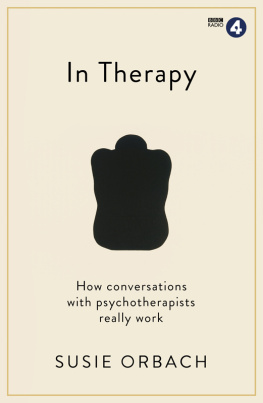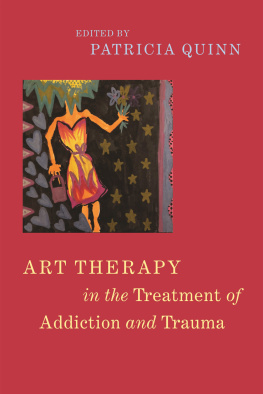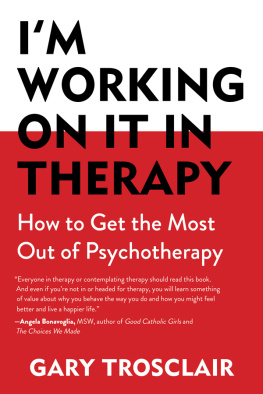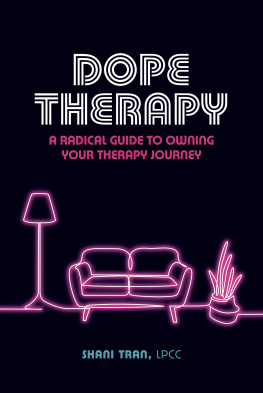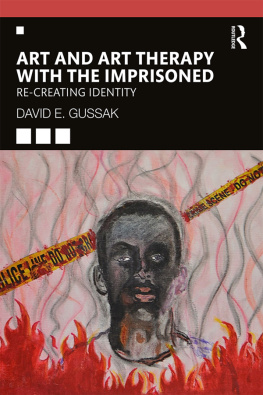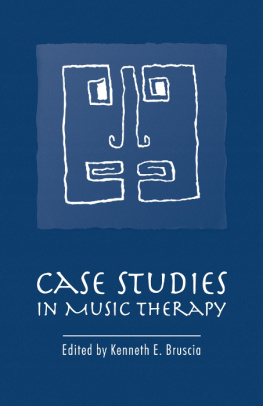In Therapy
SUSIE ORBACH is a psychotherapist, psychoanalyst, writer and social critic. She is a co-founder of the Womens Therapy Centre of London, a former Guardian columnist and visiting professor at the London School of Economics and the author of a number of books, including What Do Women Want? (with Luise Eichenbaum), On Eating, Hunger Strike, The Impossibility of Sex, Bodies which won the Women in Psychology Prize and the international bestseller Fat is a Feminist Issue, which has sold well over a million copies and been continuously in print in the UK. The New York Times said, She is probably the most famous psychotherapist to have set up couch in Britain since Sigmund Freud. She lives in London and lectures extensively worldwide.
Also by Susie Orbach
Bodies
On Eating
The Impossibility of Sex
Towards Emotional Literacy
Whats Really Going on Here
Hunger Strike
Fat is a Feminist Issue
Fat is a Feminist Issue II
by Susie Orbach and Luise eichenbaum
Bittersweet: Love, Competition & Envy in Womens Relationships
What Do Women Want? Exploding the Myth of Dependency
Understanding Women: A Feminist Psychanalytic Approach
Outside In Inside Out: A Feminist and Psychoanalytical
Approach to Womens Psychology
Edited by Susie Orbach, Lisa Appignanesi and Rachel Holmes
Fifty Shades of Feminism
In Therapy
The Unfolding Story
Susie Orbach

This revised and extended edition published in 2018
First published in Great Britain in 2016 by
PROFILE BOOKS LTD
3 Holford Yard
Bevin Way
London WC1X 9HD
www.profilebooks.com
Published in association with Wellcome Collection

183 Euston Road
London NW1 2BE
www.wellcomecollection.org
By arrangement with the BBC
The BBC Radio 4 logo is a trade mark of the British Broadcasting
Corporation and is used under licence.
Susie Orbach, 2016, 2018
The moral right of the author has been asserted.
All rights reserved. Without limiting the rights under copyright reserved above, no part of this publication may be reproduced, stored or introduced into a retrieval system, or transmitted, in any form or by any means (electronic, mechanical, photocopying, recording or otherwise), without the prior written permission of both the copyright owner and the publisher of this book.
A CIP catalogue record for this book is available from the British Library.
eISBN 978 1 78283 431 1
Contents
For Jeanette Winterson, again. My quest to share what goes on in the consulting room.
Introduction: Turning a Full Stop into a Comma
People come to therapy when avenues for understanding themselves or moving forward stall. They come because love has gone wrong, because they are frozen in unsatisfactory work or intimate relationships, because they have lost touch with themselves, because they are searching for authenticity, because they dont know how to let go, because their life is falling in on them, because they have suffered events so bruising they dont know how to assimilate them.
They come in pain, in confusion, sometimes in sorrow, sometimes bewildered or frightened by their behaviour, sometimes in anger, sometimes to express grievances. They can be full of words and yet devoid of the ones they need to express the underlying confusions. They can be full of emotions which repeat on them because the emotion that engulfs them is part of the problem covering over more subtle feelings which dont have a home in the persons sense of self. They can be full of ideas, of theories about why misfortune has befallen them.
The work of therapy is to open up these three levels: feelings, words and ideas. It aims to crack open the existing words, the existing emotions and the existing ideas. Therapy tries to slow the person (or the couple or group) sufficiently to hear, feel and think what they are saying and to have it heard by the therapist.
Words, and how they are said, take on special significance. There may be few of them, with gaps and hesitations in between. They can come tumbling out, and yet what they are saying may misfire, too jumbled to yield their truths immediately. Therapy takes the time to listen closely. To find entry points so that contradictory thoughts and feelings can surface and be acknowledged, so angers can be heard, disappointments felt, anxieties unpicked. In that hearing, a person or a couple can know themselves, their motivations, their feelings, their understandings of self, more deeply.
Therapy doesnt seek to fix the problem in a simplistic way, although good therapy always addresses the problem that is brought in. Therapys aim is to understand, to provide context, to indicate ways of thinking, feeling and being that invite the individual to know more of her- or himself, to extend their experience, to intervene in stumbling blocks or hurtful practices, to live more richly. Conflicts may remain but are often transformed. There are always reiterations but now ideas about the source of pain shift about. Where there may have been one word or one emotion to explain oneself to oneself, there may be several words and feelings and even ideas that sit alongside one another. A clamp one didnt know existed is released.
Where there once was a full stop, there can now be a comma. And where there was only a past or a future, there can be a present, informed by an examined past which can welcome rather than fear a future.
The consulting room is a place of reflection, of intense and yet often quiet conversing, thinking and feeling. The stories here encompass loss, shame, intergenerational conflict, the impact of illness, parenting, challenges of late life, lifes disappointments, the role of faith, belonging, love, hurt, achieving, connecting, failing, mothers and daughters, fathers and sons, longing, wanting and transitions. Examining these themes as we read along beckons us and the analy-sands to find ourselves, anew.
Susie Orbach, December 2017
Douglas
FIRST SESSION
Douglas rang me, breathless. He had asked around about who he should see as he was in an emergency, and he found his way to my consulting room. He is sixty-four and portly, a grammar-school boy who grew up in the Midlands.
| Douglas | Hello, Susie. |
| Susie | Hello. |
| Douglas | Im Douglas. Sorry I am late, traffic was terrible and its quite a way. So I am a bit pressured timewise. |
He claps to indicate that we should get started.
| Susie | So, tell me. |
| Douglas | Well, I mean, I dont know how this process works, I really dont. |
| I have never done this before. As you know from my email, I heard about you from a friend and I thought I would try this route because I am having some problems really, and I wanted to see if you could offer me anything or help me with this problem. |
| It is a problem really with anger, which is affecting me in my work, in my life and, well I need some advice really, some help, because I am worried that I am going to damage myself professionally. Really thats the issue I am worried about, the way I am in my job, and I need I need some help with this anger issue. I am angry all the time, I am angry in my work, I am angry with the world and I really need to know what I do with the issues that flood into my brain. |
Next page

